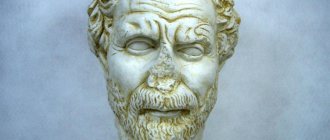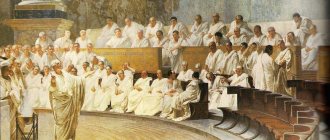“Speech is the clothing of thoughts, and eloquence is its elegant attire.”
Every day we convince someone of the correctness of our words and, perhaps, use oratory, if we have the skills.
We can participate in negotiations, sell, speak publicly, polemicize and argue. We are constantly trying to prove and defend our rights or point of view.
Every day, television announcers, print journalists, sellers and advertisers, bosses and comrades try to convince us of this or that.
Facts, reasons, arguments, reasons hover around us. We want to argue our positions in front of any audience and speak convincingly so that the opponent is intrigued and interested in our speech. What skills are needed for this, and what is public speaking?
Contents of classes
Different trainers practice different techniques; they may coincide in some ways, but not in others. Here, for example, is a plan on how to master public speaking, designed for 8 lessons.
The first lesson introduces terminology - rhetoric, stylistics, logic, the art of argumentation, oratory skills. The areas of application of skills are discussed, and it is clarified why it is necessary to master a literate literary language. Usually, at the end or beginning of the lesson, the lecturer gives everyone present the opportunity to make a brief greeting statement about themselves, their habits, hobbies, and character traits. Possible errors in speech are discussed, the concept of rhythm, pronunciation norms, intonation and articulation, and stress is given.
Lesson 2 is devoted directly to the beginning of teaching eloquence. Exemplary exercises and ways to improve the natural abilities of a speaker are described. It turns out who the person imitates (if he has an idol among famous people) and why. Workshops are held, one’s own and others’ mistakes are discussed, examples from the classics (writers, poets, actors) are studied. The role of posture, gestures, facial expressions in oratory is studied, voice strength, tempo, articulation and intonation are studied - when to use them and how. In lesson 3, we study congratulatory speech (social and everyday eloquence) - what it is, when it is pronounced, what the emphasis is on. What does it mean for the listener and the speaker, what is the difference.
The main canonical examples of such speeches, how to learn public speaking on your own, are examined in detail; at the end of the lesson, all those present try to deliver a congratulatory speech on a given topic. Errors are discussed, stress, intonation, and rhythm are checked.
Lesson 4 is devoted to business negotiations: how to prepare for them, how to conduct them, what you can (and cannot) do. The tactics of making compromises are studied. The concept of business communication is given as a complex skill in the ability to speak, give the interlocutor the opportunity to speak, offer mutually beneficial conditions (with argumentation), reach an agreement, use body language, gestures, facial expressions. The skill of using arguments in business speech must be considered: when to present them, what to emphasize.
Subsequent lessons are devoted to the ethics of business speech, the concept of the image of a business person, the correctness and accuracy of the words used, and political eloquence (with examples). Skills are consolidated, all errors are analyzed in detail, and adjustments are made.
The training ends with the formation of an individual style for each student, a thematic presentation according to an independently prepared plan.
Speech technique and voice
Those who have set themselves the goal of learning public speaking must definitely pay attention to the technique of public speaking: the ability to pause, the practice of setting intonations, body language, facial expressions, gestures, posture, and the general manner of speech of the speaker. The voice is no less important - its strength, timbre, overtones, attractiveness to listeners
The speaker must be able to captivate those present, literally captivate them, just as a professional reciter makes the audience in the hall listen to what he says. To do this, you will have to seriously train, correcting speech errors, expanding your vocabulary, working on facial expressions and intonations.
The voice is no less important - its strength, timbre, overtones, and attractiveness to listeners. The speaker must be able to captivate those present, literally captivate them, just as a professional reciter makes the audience in the hall listen to what he says. To do this, you will have to seriously train, correcting speech errors, expanding your vocabulary, working on facial expressions and intonation.
Behavioral techniques
It’s a good idea to take as a basis the behavior of a politician, public figure, or outstanding personality. To do this, you need to analyze the performance, analyze in detail what position the person is standing (sitting), the position of the head and body, hand gestures, changes in his facial expressions.
Working with the audience
The science called oratory, which teaches how to learn to speak beautifully, involves mandatory public speaking. Only by repeatedly polishing your skill as a speaker until the fear of an audience disappears and your speech becomes smooth and easy, like the singing of a nightingale, can you achieve some serious results. The main examples can be found on our website - these are workshops, video lessons, interviews with actors. But it is better to develop your own, unique style over time, summarizing the experience of famous speakers.
Grammatically correct speech
Is it possible to learn oratory: the psychology of influencing the listener and oratory abilities are not everything. Only correct and beautiful speech can make the listener take a serious attitude towards the situation and make them believe the speaker.
Check your pronunciation using a dictionary. Build sentences wisely: there should be few incomplete ones, although in real speech they cannot be avoided. Pay attention to declensions and grammatical forms. Read more, learn new interesting words and expand your vocabulary, but do not forget about the appropriateness of use. If you are unsure of the exact meaning of a word, it is better to replace it with another.
Eliminate parasitic words, do not abound in archaisms and neologisms, terms. Pronounce your words clearly. Pause your sentences and avoid ambiguity. Retell the texts. Record your speech on a voice recorder and listen to it, then work on your mistakes. Without control over your speech, you cannot develop your oratory abilities.
Who will benefit from the courses?
There is an opinion that rhetoric is needed only for those who are going to connect their lives with the theater. At least for future film actors. But the lessons will benefit not only future actors.
Mastering the intricacies of oratory will come in handy:
For managers, clear, expressive speech will make encouraging speeches more pleasant, and edifying ones more convincing;
HR managers, even if they do not deal with employees personally, but by correspondence, will never be hindered by coherent written speech and the ability to accurately formulate a thought;
therapists will benefit from the habit of oratory to formulate what needs to be said briefly and as clearly as possible for the interlocutor, without general phrases, but with the necessary amount of emotionality;
For those who like to be the center of attention all the time, such classes will give them the skill to colorfully talk about any event, describe any subject in such a way that they will be listened to endlessly;
Missionaries and preachers should include a course in public speaking as part of their compulsory curriculum, because their success depends on how emotional, persuasive and attention-holding the speech is.
There is no area where rhetoric is not useful
In life or professional activity, in personal relationships or business - the ability to beautifully and accurately convey a thought to an interlocutor occupies an important place in the list of skills
Principle 5. Motivation is important
People must have an incentive. And this is not just a solution to their problems. They should feel like they want to follow you. The most popular incentive is an appeal to civic duty. If the public is confident that what they are doing is a truly important human and heroic act, they will follow you without question.
Be careful that if what you ask of people will cost them money or time, the outcome of their loss must be consistent with their expectations.
For example, in one of the texts people are required to take the time to stand in line and sign a petition. But in return they will receive their health and the health of their loved ones. You remove the threat of disease from them, this is motivation.
Example, similarity and comparison
Comparison is probably the main, most basic technique of oratory. The most important rule of rhetoric is that everything abstract must be presented visually with the help of comparisons and examples, images, or even short stories-illustrations included in the speech. This technique sounds especially advantageous in cases where you want to convey numerical information to the listener.
For example, the well-known Mikhail Khodorkovsky, commenting on the court’s conviction, which stated that he stole 347 million tons of oil, compared this amount of fuel with the volume that could fit in “a train that circles the earth three times along the equator.” It is difficult for an ordinary person to imagine how much 347 million tons of oil is. But we all know what a train looks like, and we can roughly imagine the circumference of the Earth, which means we know that this is a lot of oil. Such a comparison, used by the speaker, helps listeners to imagine numerical data and mentally relate them to quantities familiar to them, making abstract numbers tangible.
In addition to the usual comparison, there are also its individual forms, such as image and metaphor. Unlike the usual juxtaposition of two things in speech, these oratorical techniques have a creative flavor. As a rule, images are not created artificially by us. They come when we observe the world around us and build associations. If you want to decorate your speech with images, but are experiencing certain difficulties in producing the necessary imagery, we recommend that you familiarize yourself with a special lesson on our website aimed at developing associative thinking, and also practice solving doodles.
In some cases, to create images and analogies, you can even resort to short stories, if the speaking time allows you, of course.
However, you should not delay the moment of illustration; it is important to create a clear and vivid image that will remain in people’s memory, without overloading their attention with abstract reasoning
A similar method of comparison, which is based on the relationship of a part to the whole, is synecdoche (renaming)
. This is a way of expressing thoughts in which a word is used in a figurative meaning, namely, the concept of a known object or group of objects is replaced by a concept denoting a part of the named object or a single object. For example, when we hear the phrase “The White House and the Kremlin have different opinions,” we understand that we are not talking about architectural structures, but about representatives of certain political forces in the United States and Russia who did not agree on some issue. Synecdoche gives the speaker the opportunity to briefly and expressively convey his thought to the audience, leaving in their memory a certain image of what was said.
Transactional psychology
The sword and fire are less destructive than the tongue. (Richard Steele)
Don't always say what you know, but always know what you say.
(Claudius)
Speak only when you are calm.
[!] (Chinese proverb)
One word can lead to a quarrel forever.
(Russian proverb)
Stop talking immediately when you notice that you yourself or the person you are talking to are getting irritated.
(L.N. Tolstoy)
You should never say: “You didn’t understand me.”
It’s better to say: “I didn’t express my thoughts well.” (Robert)
In general, for information on how to prevent negative emotions, see the Anti-stress page.
- .
What books are worth reading?
When answering the question of how to learn eloquence, it is useful to study special literature. To do this, it is not necessary to study the dictionary; there are various educational and interesting manuals.
The following educational books will be useful for self-study:
- Irina Golub’s book “The Art of Rhetoric. A manual on eloquence."
- Practical advice and recommendations are presented in the work of Radislav Gandapas “The Kama Sutra for the Orator”.
- “Oratory for Beginners” by O. Bolsunov is popular due to its thorough analysis of the mistakes that speakers make.
- Black Rhetoric by Carsten Bredemeier includes exercises and techniques to help you speak persuasively and negotiate with the right arguments.
Regular reading of fiction also enriches your vocabulary. Classical fiction allows you to study the stylistic presentation of thoughts and, to some extent, adopt the beauty of the presentation of the syllable.
Specialized business literature will help you learn to communicate competently and professionally in your field of activity.
Literature on the psychology of communication will help you correctly formulate the logic of speech. There are different categories presented here: negotiation techniques, communication skills and public speaking.
Literature on the psychology of communication teaches the correct formulation of the logic of speech. There are different categories presented here: negotiation techniques, communication skills and public speaking.
How to develop speaking skills
To master the secrets of oratory, you can enroll in courses and trainings on rhetoric, take lessons for beginners, choose online training, or study a self-instruction manual on eloquence. All these options are offered to our attention by the vast Internet.
If you like independent training in the development of public speaking, let's work on the technique of delivering a speech, prepare for a speech, learn how to interact with the audience and take on board some practical tips.
Speech technique
The sound of speech you want to listen to depends on the following components:
Breath. The pace should be measured, with the inhalation being shorter than the exhalation. Do not inhale “all the way” so that you have the opportunity to take a breath. It's the same with exhalation. Special exercises help improve speech. For example, developing the skill of breathing from the bottom of your lungs will make your voice stronger and your speech fluent. Volume. By controlling his voice, a speaker influences the audience's perception of what he says. If your voice is naturally quiet, you can make it louder. To do this, read expressively out loud, count to ten as you exhale, gradually increasing the volume of your voice. Diction. Tongue twisters will help you speak clearly, clearly pronouncing sounds, if you are not lazy and do not forget to load your articulatory apparatus with them. Pace. We must try to express our thoughts at an average pace, not to waste words and not to draw them out.
Since the temperament and internal state of a person at the time of the performance plays an important role here, it is important to calm down and tune in to a fruitful dialogue with the audience. Intonation. With its help, your speech will be remembered by the listener because it will be alive. Practice reading works of art aloud with expression, just like in school.
Preparing for the performance
At this stage, the text of the speech is prepared. We already know what a properly composed public speech should be. In order not to read from what is written, you should first of all memorize the text, and draw up a plan and main points for the meeting with the audience.
To be ready for improvisation, you must have developed logical and imaginative thinking, have a rich vocabulary and a broad outlook. Read different literature, keep abreast of social events.
To maintain the proper mood among the audience, stock up on a number of interesting facts, light jokes, and entertaining short stories.
To avoid being caught off guard by the technical side of your presentation, be aware of organizational issues: hall, audio equipment, video materials.
Don't forget that people are greeted by their clothes. Make sure you look appropriate and appropriate for the moment.
Interaction with the audience
A good speaker knows how, from the first minutes of meeting with listeners, to please them with his appearance and friendly manner of communication. With qualities such as honesty, openness, and politeness, the speaker wins the trust of the listener.
He feels the audience, predicts their reactions, controls the course of his speech and masterfully achieves his goal.
Tips for a beginner speaker
Here we will answer the most frequently asked questions.
- How to learn to speak in front of an audience? Only by speaking repeatedly can you gain experience in public speaking. At work, at home, meeting with friends, participating in various events, you should try to develop this skill. To do this, you will need to expand your horizons so that you have something to tell; train your memory to remember unusual facts and stories.
- How to present information in an interesting way? Learn to master public speaking tools. Facial expressions, gestures, body language, intonation, voice timbre will arouse genuine interest among listeners. Give it a try. Create a video of your performance. Assess its level. Praise yourself.
- How to overcome fear of an audience? Such a necessary quality as self-confidence is acquired with oratory experience. A little excitement can even help you make your speech memorable and inspire the room. Develop leadership qualities in yourself, tune in to positive communication with the listener. This will help overcome the strong excitement that arises at first.
Repeat
In one of the lessons on memory development on our website, there is an entire section devoted to repetition, because repetition is the most important principle of memorizing information. In oratory, repetition is used, which more deeply cements the main idea of the speech in the minds of the audience, increases the persuasiveness of the speaker’s speech, evokes memories in the listeners, helps to correctly organize the speech, and present new information as already familiar. So if you want your listeners to remember the necessary information well, repeat it and get the desired effect.
However, it should be borne in mind that ordinary word-for-word repetition of material is effective only in certain circumstances; in most cases, repetitions become an effective technique for a speaker only if they are skillfully framed in speech. The following types of repetitions can be distinguished :
| ✔ | Verbatim repetition. This type is used quite rarely: only when quoting verbatim, or for deliberate emphasis on a specific phrase, especially an exclamation. For example, Martin Luther King exclaimed in almost every sentence of his famous speech: “I have a dream!” In addition, in both prose and poetic speech, a technique close to literal repetition, anaphora, is often used. The essence of anaphora is the repetition of similar sounds, words or groups of words at the beginning of separate phrases. Anaphora also plays a big role in the formation of a clear, established image of the expressed idea in the minds of the listeners. |
| ✔ | Variable repeat. More often, to repeat important thoughts in oratory, variable repetition is used, that is, returning to what has already been said earlier in a different verbal form, expressing the same thought in different words. The semantic content of the repetition in this case will be presented to listeners with different shades, which will make the idea more vivid and expressive. |
| ✔ | Extended repetition (clarification or recursion) - repetition of an already spoken thought with the inclusion of new words to develop the main ideas and images of your speech. If the expression of thought you initially chose does not seem convincing enough to you, you should return to it during the course of your speech and supplement it and explain it. However, it is better not to overuse this technique, since your words and ideas that are repeated too often may seem intrusive and tiresome to listeners (remember the famous humorous poem “The House That Jack Built” translated by Samuil Marshak or the song “Night Watch” by Alexander Pushny with an endless number of extended repetitions). Try to use more concise and concise images instead of frequent repetitions with detailed explanations. |
| ✔ | Partial repetition and refining (generalization) is used to briefly orient the listener in previously presented material, for example, before moving on to a new part of the speech. This is a general repetition, in the form of several precise brief statements. This technique is especially suitable for educational presentations (lectures), when the lecturer needs to periodically summarize previously obtained conclusions. |
However, the entire arsenal of these techniques is not exhausted.
Types of performances
The purpose of public speaking is to motivate the audience to take certain actions.
The main criterion for the effectiveness of a speech lies in the actions of the audience. Based on this, there are four formats for performances.
Inspirational speeches
Speeches should sound like they encourage some action. For example, you are a seller of a certain product, and sales of this product depend on your performance.
You give a presentation that encourages the audience to sign an agreement with you or vote for your candidacy. These speeches require a serious approach and oratory skills.
Ritual performances
Ritual speeches are most often made by the compere when introducing someone, or opening speeches, and toasts also belong to ritual speeches.
The purpose of ritual performances is to change the attitude of the audience
If we are talking about a birthday person, then listeners should pay attention to him. If a speaker introduces himself, the audience should treat him better
Oratory in such a speech is necessary, since you need to be able to attract the audience and prepare them for further actions.
Informative speeches
Speeches that have the lowest form requirements are lectures. They do not oblige the speaker to be interesting, eloquent, prim and intriguing, since the audience is dependent on the speaker, and not vice versa.
Everyone must pass the session, everyone has the right to listen or not listen to the speaker. Unfortunately, not all modern lecturers master the art of oratory.
Entertaining Speeches
This is a professional art that requires certain knowledge, which is used by actors, theater-goers and comedians. Although among them there are also worthy speakers.
Jim Carrey gave a stunning and hilarious speech to university graduates that they will remember for a long time. We can only draw conclusions that no matter who you are, oratory skills will not harm, but will only help in any current situation.
Author of the article Elena Zhuk
Sophistry
Sophistry
(from the Greek “cunning invention, trick”) are false statements that, nevertheless, upon superficial examination seem correct (“imaginary evidence” according to Aristotle). Sophistry is based on the deliberate, conscious violation of the rules of logic by the speaker to mislead listeners. Sophisms can be logical, terminological, psychological and others.
Sophistries as one of the techniques of oratory are described in more detail in a special article in the “articles” section, however, we do not recommend using sophisms in your speech, since you should resort to them only as a last resort, when other techniques do not work. If you are caught using sophistry, it will subsequently be extremely difficult for you to convince your audience of your objectivity and correctness.
All of the above oratorical techniques are often interrelated, and one technique entails the use of another. However, you should not use them too closely, otherwise they may begin to work not for you, but against you. Techniques differ functionally: some of them influence the content of the speech and are able to hold the attention of listeners and convince them of their point of view, while others are aimed at preparing the audience and designing the material.
Speakers can use many of the rhetorical rules discussed intuitively, but when preparing for a speech, we recommend that you consciously familiarize yourself with all the techniques so as to be sure not to lose sight of their possible influence and effect on the audience's perception of your speech. We also recommend taking a case study about Steve Jobs.
Basics of public speaking
Oratory is understood as the creative activity of speaking in public, which skillfully combines rhetoric, psychology and acting. All this in place contributes to the persuasion of the listeners. Rhetoric and the basics of oratory are supposed to be mastered by every person. However, an exceptionally purposeful and talented person is able to skillfully apply knowledge in practice, using the right quotes and correctly spoken words. Nowadays, this art is divided depending on the scope of application:
- Socio-political eloquence is associated with performances, reports and speeches in the political and economic spheres, as well as with the social side of society.
- Academic - this includes lectures, reports and speeches with the aim of conveying information of a scientific or educational nature to the audience. The presentation of such reports occurs according to a specific plan and requirements.
- Social and everyday eloquence - implies speeches aimed at congratulations, remembrance, etc.
- Judicial - these include judicial, accusatory and defensive speeches, the professionalism of which determines the success of a lawyer’s career.
- Theological - associated with sermons in churches of different denominations.
In addition to this classification, we can highlight speeches on television and radio, advertising and other areas of life in which oratory is successfully used. In short, the basics of oratory include:
- High communication, ability to speak in public, convey information and listen to other people.
- The ability to treat your partner’s words with respect and objectivity.
- The ability to find contact with any person, find out what connects you and what common interests you have, after which you can build effective interaction.
The basic concepts of the theory of oratory include ethos, logos and pathos. Ethos refers to the ethnic part of the speaker’s image, which plays a small role in our time. Rules of conduct, moral norms and values determine his attitude towards listeners and the goals of his work. The moral and ethical requirements of the speaker in relation to the audience are considered fundamental in any speech.
The concept of logos describes the use of such verbal means and figures of speech that will reach the mind of the audience. That is, it includes a thorough knowledge of its subject, mastery of the art of argumentation and logic of statement.
The third category, pathos, includes the emotional side - the extent to which a person can emotionally influence the audience and express concern for his subject. You can add expressiveness to your speech through intonation - pauses, different timbres, changes in the tempo of speech. Thus, the basic concepts of oratory combine the qualities that define a good speaker.
The psychological foundations of oratory can be briefly described as follows:
- The ability to make a good impression on a partner or audience.
- Express your thoughts or ideas in a way that interests the other person.
- The ability to adapt your speech and the topic of the report (communication) so that the listener understands everything.
- Creating comfortable conditions for communication.
- The ability to objectively evaluate the listener.
Practical advice
When studying on your own, you should use the following tips:
It is necessary to monitor your speech and carefully choose your social circle. Reading books will allow you to develop a rich vocabulary and increase your knowledge. It’s better to talk a little, but only to the point. We must strive to ensure that every phrase spoken is bright and complete. It is recommended to prepare a speech for a public speech in advance.
It is important to prepare mentally for improvisation. You need to speak clearly, calmly and loudly, but not loudly. When reading a report, you need to look at people, not at papers. Using pauses, it is necessary to highlight formulations and important words.
A professional approach involves finding your own style in oratory. A delivered speech helps to affirm your beliefs and influence people, but you cannot impose your opinion.
It is important to convince the audience that is ready to listen
It is necessary to gain experience, because only practice will help hone your skills.
No less important is the question: how to improve the beauty of speech in your child. Such a skill will allow you not only to answer well at the board, but also to become a successful person in the future. To do this, it is recommended to read books, listen to audio fairy tales and arrange home performances. It is necessary to encourage the child to speak and ask him leading questions.
Regular classes and hard work in developing eloquence can turn almost any person into a real speaker.
Oratory in life
The skill of public speaking is the use of tools against the background of psychological stress. And no matter what books we read, no matter how hard we try to apply our knowledge, we cannot do without a psychological understanding of a person.
In public speaking, the likelihood of something going wrong is high. No matter how a person manages the situation, the success of his speech depends on the number of listeners who have their own habits and motivation. The level of tension during a speech is extremely high, so the speaker’s skills tend to be blocked.
The art of oratory does not have prescribed laws for high-quality performance, but it is clear that it is a tool of influence on others that has no equal. No motivation system can give such an effect as an energizing motivational speech. No amount of effort to relieve tension and instill confidence in a crisis situation will provide such a boost as one inspiring speech.
A person who applies and improves the art of oratory simultaneously develops a higher degree of self-confidence, emancipation, and freedom.
Speaking in public, we hone our skills of argumentation, eloquence, and persuasion. In one-on-one communication, these skills work in the same way, but in a slightly simpler way.
The Art of Eloquence of Ancient Rome
The Romans wisely dealt with the history of oratory, the legacy of outstanding Greek orators, gradually developing the achievements of their predecessors and increasing them. Already in the 2nd century BC, there were humanitarian schools on the territory of the Roman Republic, in which boys, future politicians, public figures, and judges were taught the art of public speaking. The study of classical disciplines was divided into several stages:
- Reading classical literature.
- Correct writing based on grammar requirements.
- Mastering eloquence by composing your own speeches.
What was taught in Roman schools was told in his work “Rhetorical Instructions” by Marcus Quintilian, who himself had extensive experience as a teacher, as well as a trial lawyer. His study of sciences and books was accompanied by an in-depth knowledge of the rules of oratory, including the history of its origin.
A philosopher and teacher who became famous in this field, much more than as a judicial figure, Quintilian devoted his life to a detailed, methodical analysis of the qualities necessary for an orator, and the means by which they can be developed
His books give advice on how best to accumulate quotes from famous authors, popular expressions, with special attention paid to constant oral conversations that form syllables, a sense of rhythm, and experience in conducting discussions.
A good speaker, as the eminent Roman believed, can be recognized by his coherent, beautiful speech and special sophistication of phrases. In his works, he came up with a number of recommendations aimed at practical improvement of speech, elaboration of facial expressions, posture of the speaker, and mandatory adherence to logic.
Another famous figure from the Roman Republic, Cicero, achieved significant success in his career by improving the qualities of a rhetorician. The speeches of the judge, and later of the consul, amaze with the impeccability of logic and carefully selected arguments. He considered Aristotle and Plato his teachers, going back to the Greek school of discussion. Cicero’s views were reflected in his treatises (“The Orator”, “On the Construction of Speech” and others).
Public Speaking course program:
First lesson. Confident speaker.
How to make the right positive impression? Working through the fear of public speaking, techniques for getting rid of anxiety. Creating a basis for confident behavior: we stop being afraid of the audience. We accept feedback. Self-presentation. Facial expressions, gestures, posture, gaze.
Second lesson. Speaker Tools Voice control.
Working with breathing, articulation, tempo and diction. Logical and psychological pause. Practical study of intonation.
Third lesson. Structure of the speech Structure of the speech.
Theme, purpose, awareness. Plan. Audience profile. Elaboration of “entry” options. Competent conclusion of the speech. Ways to attract attention. Creating a speech based on the principle of “problem and overcoming it.” Creating a speech aimed at achieving your own goals.
Fourth lesson. Persuasive speech, thesis, argumentation, working with objections.
Laws of constructing a persuasive speech. Analysis of techniques for motivating listeners to take one or another action. Competent argumentation. Create your own speech that will convince listeners of the correctness of your position. Receiving feedback on which arguments motivated better and which were worse.
Fifth lesson. Working with questions. Creating vivid images.
Integrating your ideas into answers to questions. Avoiding inconvenient questions in the direction you need. Working on the skill of “taking a punch.” Training emotional stability when answering unexpected questions.
Creating your own speech - a bright, interesting story-sketches from your life. This lesson brings together all the skills developed in the course. The main task is to perform taking into account everything you already know.
Receiving feedback on a performance. Identifying further directions for the development of “eloquence” in oneself. Summarizing.
Public speaking courses are designed for all people who have to speak publicly, be it managers, company executives, lawyers, journalists, IT specialists, politicians and those who are planning to become them, students and people looking for work, etc.
In the public speaking course, the main emphasis is on developing your eloquence, confidence in yourself and in what you do. The basis for this confidence will be practice based on theory selected from the best sources on public speaking. The ratio of theory to practice: 1:3.
Only regular exercises give real results to those who are ready to work on themselves!
The “Oratory skills” courses in the training center in Kharkov will help you:
- overcome the fear of public speaking and master the skill of confident behavior.
- learn to convey your thoughts in a high-quality, beautiful and understandable manner.
- learn and practice influence techniques during performances.
- learn to control yourself, your emotions, intonation, gestures, facial expressions, gaze.
- learn to create successful performance compositions.
- develop your speech apparatus
Important! You can take the Public Speaking course in the format of individual lessons!
It is possible to make up a missed lesson (no more than one) in the next group or individually.
The duration of the “Elocution” course is 5 lessons on Saturdays for 4 hours (from 11:00 to 15:00).
The cost of the course “Oratory skills” is 3,500 UAH.
The cost of training includes a workbook with practical tasks and basic theory, a coffee break, and video materials.
The leading trainer of the “Oratory Skills” course is Elena Pochueva, head of the training, philologist-linguist, practical psychologist, certified trainer-consultant, stylist-image maker.
Types of public speaking techniques
Conventionally, oratorical techniques can be divided into several classes or so-called “types”. The classification allows you to create a more structured plan for study and subsequent practice, so that you can work step by step towards perfection of speech patterns and tricks. So, there are the following techniques of oratory:
Tropes are different types of comparisons that allow you to rid your speech of unnecessary repetition and, if necessary, express the appropriate emotional intensity during the speech. If you want to perfectly study the secrets of oratory, then you should start with epithets, metaphors and allegories, which will allow you to master both journalism and academic speech
In addition, often when it is necessary to explain complex terminology or technology, allegories will always come to the rescue. Repetitions are the opposite of the above-mentioned type of oratorical tricks, allowing you to concentrate the public’s attention on a specific fact or moment of the speech. As with tropes, you need to be able to use them without oversaturating your speech in order to maintain balance
The types of repetitions and tropes used directly depend on the type of speech that you decide to use in a particular case. So, during an academic speech, it is better to use word-for-word repetition of the main points of the plan being read, so that what is said is better fixed in the minds of the listeners. Focusing is one method of tailoring material to the audience. It is necessary to understand who you are speaking to and what will be the main thing in your words for this audience. One of the elements of this type is framing, which translated from English means “Breaking into parts,” remains an important element of neurolinguistic techniques for programming people. This is the ability to present an idea to people so that they think that it is their own idea. A frame is a kind of context in which you present a particular statement. Like placing commas in sentences, it can greatly change the underlying meaning of your speech. On this topic, it is best to read the book “Tricks of Language” by Robert Dilts, in which he describes how you can present the same idea, as well as how to change the angle of people’s perception to suit the speaker. There are 14 basic framing techniques that simplify the presentation of material. Sophistry is a false statement presented under the guise of an axiom. It is often used in philosophical debates and church speeches in order to confuse the opponent. The point is that you deliberately want to mislead the listener in order to then show a way out by concentrating his attention on a particular problem. Sophisms can be divided into logical and terminological; one of the well-known ones is the word “Literally”, which is often used in the wrong interpretation. Sophisms are divided into open and secret, the latter being resorted to as a last resort. Their goal is also diametrically opposite, because in the first case you are trying to gain the trust of the audience by showing your openness and good logic. In the second, the speaker tries to deliberately mislead the audience in order to present this or that thought from the right angle. If you are caught in hidden sophistry, you risk losing the attention and trust of the public, which will lead to a disastrous outcome, so you should be extremely careful with this tool. Other techniques, which include various techniques for embellishing speech and expressing one’s thoughts. These include allegory, which is also used in tropes, but is often not classified as this type of oratorical technique. This type is studied after you have mastered all the others, and is a jewelry tool that allows you to sharpen your technique, ridding your speech of possible ailments or, conversely, embellishing an already formed oratory.
Each type has from 4 to 15 different techniques, and talking about each one will take a lot of time. Let's highlight the basic techniques of oratory and their content, with which it is worth starting to get acquainted with the art of oratory, and which are necessary for every person who speaks in front of the public or wants to improve his speech.
Rules of behavior for a speaker
What are the basics of oratory? We need to learn how to make speeches that can produce changes in people.
Speak in such a way that people can not only state that they had a good time, but after your speech strive for certain actions to which you tried to induce them, to what you persuaded them to do.
In public speaking, there are no endless rules that need to be memorized for half your life; you just need to master a simple algorithm of actions. On the basis of acquired knowledge, through practice and experience, one can achieve considerable results in oratory.
- The basics of public speaking are easy to learn from good speakers. By observing their actions and studying their behavior, you can adopt their speaking tactics.
- The human cerebral cortex contains mirror neurons that allow learning by observing the actions of another person. So little children repeat everything after their parents, eat what their parents eat, talk the same way, even with the same intonation. This is one of the most important conditions for increasing speaker skills.
- Public speaking requires knowledge and skill and definitely requires practice. Without reading the right books and educational literature, which clearly outlines what it is and how to master the skill, skills will not be able to grow at the speed you need.
- Knowledge has no value without practice. Also, any knowledge can become boring if it is not applied. There is no audience - oratory will help you, the exercises of which can be done in splendid isolation in front of a mirror. You can familiarize yourself with such exercises in books on public speaking.
- A real speaker should not be bothered by negative thoughts, especially the fear of failure. This will certainly interfere with your performance in front of an audience. During the performance, all extraneous thoughts must be removed from your mind. Complete enthusiasm for the performance will leave no room for excitement and worry.
- Oratory art includes the rules of conduct for a speaker. A good speaker will not be afraid of an extraneous phrase from the outside or an inappropriate question. He is in control of the situation, and during the performance he is the only one in control. To do this, there is no need to be rude and argue, you need to find contact with the audience and be a little higher than it. You can achieve such a result only by knowing your business, and confidently arguing and convincing your listeners.
- Clear and precise speech and correctly placed phrases will not allow the audience to fall asleep during your speech. Even a boring report can be diluted with interesting facts, especially if the names of famous people are involved.
- And the speech will be more effective if the audience is involved in the discussion. Oratory is about using the technique of involvement, but within an acceptable norm, since your oratorical place can be taken by a more active listener.
- There should be no text on the paper that will lie in front of the speaker; the bad speaker is the one who reads his speech. Apart from the outline of your speech, nothing should be in front of the speaker. Looking into each listener's eyes for a few seconds will help you achieve greater success. Oratory says that before speaking, a speaker must rehearse his speech many times.
- Moderate gestures and enthusiasm in the face will always come to the aid of the person delivering the speech. A light, friendly smile, confirmed by a calm pace of speech, is the first step to victory. It is precisely this tactic that attracts attention and is remembered faster than the monotonous boring story of a faceless creature.
The ability to please
We always strive to make an impression on others and leave it in people's minds. To do this you need to be able to please, which is quite difficult.
It is necessary to make an impression immediately upon appearing in society. To do this, it is important to understand the psychotype of your opponent or group of people, to know with whom and how you can talk.
All this knowledge can be obtained by studying oratory, which combines two components that study the questions of what to say and how - this is oratory and rhetoric.
The books by R. Gandapas “Charisma of a Leader” and “101 Advice to a Speaker”, “Arsenal of a Speaker” may be useful for you. Full ammunition" by A. Kovalev, B. Morev and Convince and Win. “Secrets of effective argumentation” by N. Nepryakhin.
It is not difficult to understand people, you just need to look at them carefully. It’s easier for us to communicate with people like ourselves - these are completely subconscious actions.
Therefore, talented negotiators are skilled in mimicry. This is an important quality of oratory. They know how to hear and see the desires of the party with whom negotiations are necessary, and build a system of motivations and appearance in such a way as not to cause irritation.
Reasons for irritation of the interlocutor
To make it easier to navigate in an unfamiliar society, and to prevent your opponent from becoming irritated even before the conversation begins, it is important to know some rules:
- Oratory for dummies begins with a person’s appearance. They greet you by their clothes. Of course, a sloppy appearance is a serious irritant, but sophisticated luxury in clothing style can cause the same reaction. You may be madly in love with your expensive watch, but it will annoy the person you are talking to. Exquisite poverty cannot inspire confidence either. Conclusion: clothing should be discreet and adequate.
- Everyone understands perfectly well that smells play an important role in communication. And it’s better not to use any cosmetics than some. We won’t dwell on cleanliness, since even kids know this fact. But women often overdo it with scents. The trail of perfume does not always fascinate the opponent so that he can be manipulated, sometimes vice versa. And even first-class oratory skills will not be able to attract the attention of your opponent.
- We, looking at a person, try to understand who this person is. Men are judged by their physical fitness, since the level of competition is inherent in them from birth. Women always evaluate from the position of rivals. But you need to clearly understand which areas need to be removed from consciousness and which ones should be presented correctly. If we do not look a person in the eye, he gets the impression that we are hiding something. If the head is slightly set back, then this speaks of our arrogance. Our task is to know how we should appear to our interlocutor. By scanning a person, we should draw conclusions about what can be done and what cannot be done, and how to behave. This aspect is extremely important in oratory.
- If our interlocutor speaks with an accent, then in order to find a common language with him we should not try to speak with him in the same way, with an accent, to catch the pace of his speech - this is the main task. We need to be able to get into a speech rate that is comfortable for our interlocutor. Only by listening to him can you understand how and what he will be able to perceive.
- If we want to convince our interlocutor that we are right, then logic cannot help with this. A person always makes decisions at two levels: rational and emotional. When we appeal to his “rationality”, but the opponent’s emotions are not completely drawn to our side, he will find himself justification for the falsity of our logic and departure from it. The situation of conviction is zero if we are not one hundred percent sure that we are right.
Oratory for dummies cannot be understood without all the above-mentioned rules and without special literature on oratory and developed techniques for beginners.
Important Tips
- Oratory skill lies in the fact that the owner of knowledge will not be intimidated by the number of listeners or the status of many of them. He will always find a topic interesting to any interlocutor; from the first minutes he will determine how to attract even an unfamiliar interlocutor, but will not be intrusive.
- Any performance, even the best one, can be made a little better. All processes have a certain structure, built on the universal law of compositions. It was not invented by man, but only recorded by him. This is the law of nature. All extended processes begin with build-up, development, preparatory action, and only then does the main action occur, and only after it does some attenuation occur. For example, a restaurant serves cold appetizers or an aperitif in order to prepare the visitor for the main course, then the main course is served, and dessert is served at the end. An appointment with a doctor also has its own composition. Therefore, the speech should be prepared according to the same principle.
- Modern speakers make a common mistake. Unfortunately, they either exclude the introduction altogether or utter predictable banal phrases. And it is the introduction that plays the most important role, and it must be carefully prepared, no less than the speech itself. The further perception of the entire speech by the audience depends on it - this is warming up, preparation.
- If a person could not assert in a few minutes his right to hold the attention of the audience for several hours, then it is unlikely that the audience will be inclined to lend such a speaker for more time. It is possible to intrigue and interest a modern audience only with an unconventional and carefully thought-out introduction.









